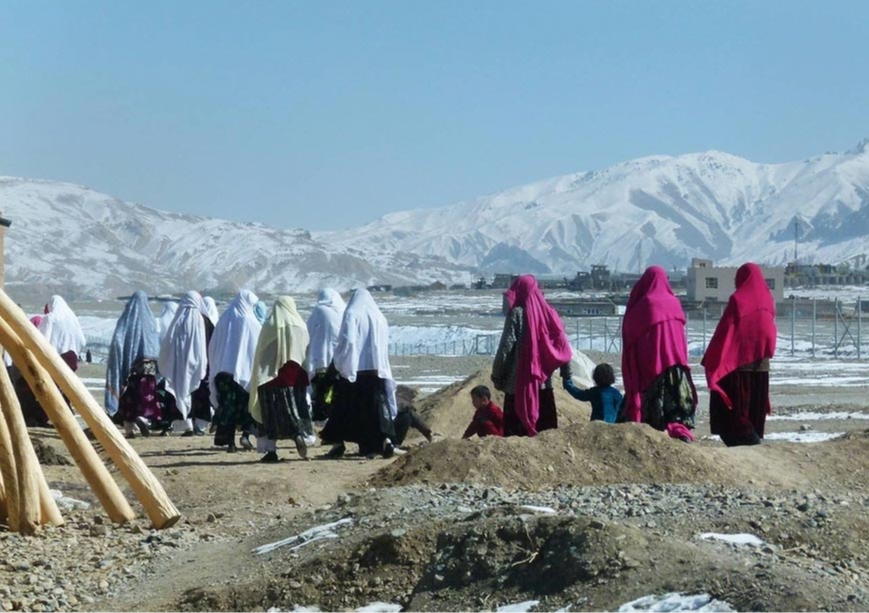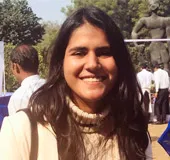
Source Image: Aurora Alambra
On 6 January 2024, a minibus with civilians was attacked by the Islamic State Khorasan Province (ISKP) in the predominantly Hazara-dominated area of Dasht-e-Barchi of west Kabul, killing five people and injuring 15. This was followed by two more attacks claimed by the ISKP and three unclaimed attacks but with similar tactics, targeting the minority Shia community. These attacks are a continuation of the ISKP's persistent onslaught against the Hazaras since the fall of Kabul. For the Hazaras, this is just one form of violence that they are facing, along with the systemic discrimination and persecution meted out to them by the Taliban’s Islamic Emirate. As the Taliban solidifies its footing in Afghanistan and the international community develops a working relationship with the group, it is imperative to take cognisance of the dual nature of the threat that the Taliban and the ISKP pose to the Hazaras, via systematic persecution and targeted violent attacks directed at the group.
For the Hazaras, this is just one form of violence that they are facing, along with the systemic discrimination and persecution meted out to them by the Taliban’s Islamic Emirate.
Systemic alienation: Hazaras in the Emirate
The Shia population in Afghanistan, most of which are Hazaras, make up approximately 10 percent of the country’s total population. Both the Taliban and the ISKP view them as ‘infidels’. Owing to their ethnic and religious identity, the Hazaras have always been on the receiving end of violence from both state and non-state actors. After their return in 2021, even though the Taliban reiterated its commitment to protect the country’s minorities, especially the religious minorities, the fear of mass executions and memories of the Taliban’s previous rule (1996-2001) drove many Hazaras to seek refuge in other countries, like the imambargahs in Quetta in Balochistan. Some sections also extended their support to the Emirate; in November 2021, in an apparent bid to protect their interests, close to a thousand Hazara elders gathered in Kabul to pledge support to the Taliban, hailing the end of ‘the dark period’ under the US-backed Republic and reaffirming their allegiance to the Emirate.
Soon after coming to power, the Taliban blew up the statue of the Hazara leader Abdul Ali Mazari in Bamiyan—a blow to any hope of moderation towards minorities. Reports about forced relocation and the Hazaras’ evictions from their ancestral lands and the land being given to the Taliban’s supporters also cropped up. They were removed from the Daykundi, Uruzgan, Kandahar, Helmand and Balkh provinces on short notice with no recourse to any legal redressal. Nearly 2,800 Hazara residents were evicted from 15 villages in Daykundi and Uruzgan in September 2021. This strategy of forcibly taking the Hazaras’ lands has been historically used to subjugate the group. Under the pretence of reform to build an Islamic system created by and for the Taliban, ethnic Hazaras were also excluded from the government's bureaucracy and the judiciary. They only received token representation in the political setup, with Mawlawi Mehdi Mujahid being the only Hazara appointed as an intelligence chief of a central province when the group gained power. Mujahid was subsequently killed in August 2022 allegedly for rebelling against the Emirate. The group has also been targeting members of the community they perceive as a threat, with extrajudicial killings reported since they usurped power.
The Taliban's discriminatory practices, including restrictions on women's rights and education, have disproportionately affected women from the Hazara community.
As per a report by the UN Secretary-General, António Guterres, on the situation in Afghanistan, the Taliban have increased their outreach to different constituencies, meeting representatives from the Shia community. But they have used their control over the country’s bureaucracy and all other arms of the government to dispossess and alienate the Hazaras. Since 1 January, the group’s notorious Ministry of Virtue and Vice has been detaining women on violations of donning a ‘bad hijab’. These arrests first began in the Hazara-dominated areas and were seen by many Hazara leaders as selective targeting of the group. The Taliban's discriminatory practices, including restrictions on women's rights and education, have disproportionately affected women from the Hazara community. The group has diverted aid intended for the Hazaras to the groups that support it. Last year, the Ministry of Higher Education under the Taliban also came out with a decree ordering the removal of all books belonging to the Shia sect or written by Shias, Salafis and the political opponents of the Taliban and deemed different from the Hanafi jurisprudence. The group also banned marriage between Shias and Sunnis. The formation of the provincial ulema councils in a number of provinces also had no Shia or female members.
The deteriorating relationship between Pakistan and Afghanistan, because of the threat of the Tehreek-i-Taliban (TTP), has also indirectly adversely impacted the Afghan Hazaras. Historically, Hazaras have taken refuge in Pakistan to escape the brutal crackdown and repression at home. The Pakistan government’s decision to evict Afghan refugees from the country in November 2023 put the Hazaras at risk as they feared persecution at home. Even since the plan to deport was announced, many were arrested and evicted from their jobs.
Under the ISKP’s radar
Even before the Taliban’s return, educational institutes and maternity wards in Hazara-dominated areas were targeted by the ISKP. Over the years, the Hazaras have been attacked at public gatherings, in schools, mosques, and hospital wards. In 2018, the UNAMA reported 19 incidents and, in 2019, 10 incidents of the ISKP targeting the Shias. The intensity of attacks perpetrated by the ISKP has seen a jump since the fall of Kabul. In October 2021, the group targeted the largest Shia mosque in Kandahar, killing around 40 people. The ISKP has been following a strategy of targeting minority groups and high-value targets simultaneously. As per the UNAMA, since the Taliban’s takeover, in the first 21 months, around 345 Hazaras were killed or wounded. Between 1 August and 7 November 2023, the UN recorded eight attacks by the ISKP, targeted at civilians, particularly Shias.
The ISKP has been following a strategy of targeting minority groups and high-value targets simultaneously.
The Taliban’s control over the government and all existing structures in Afghanistan and their historical enmity with the group could have acted as an incentive factor for groups like ISKP to continue their attacks and targeted killings of the Hazaras. Many resistance groups also view this as a point of convergence between both the Taliban and the ISKP and don’t rule out the possibility of the two coordinating on this issue.
To bring attention to the persecution of the Hazaras and urge the international community to recognise their ‘genocide’, many organisations and activists came together around the world last month, in more than 30 cities worldwide, calling for action and for fixing culpability on the perpetrators of the attacks on the Hazaras. In the past two and a half years, the degree of engagement between the international community and the Taliban has increased. While countries have urged the group to increase the representation of women and ethnic minorities and comply with governance, security, and other demands, their leverage in terms of pushing the Emirate to do their bidding in return for cooperation has failed to materialise. The Emirate recently held a Regional Cooperation Initiative meeting in Kabul, which saw participation from 11 neighbouring countries, including India, China, and Russia. The Taliban used the platform as a means of setting its narrative about how it wants the international community to engage with it—focusing on trade and economic linkages and regional security, with questions about the inclusion of women and other marginalised groups pushed back. This will further sideline these minority groups, making them more susceptible to violence and enabling the Islamic Emirate to continue with its discriminatory policies and bureaucratic high-handedness.
Shivam Shekhawat is a Junior Fellow at the Observer Research Foundation
Anjjali Shrivastav is a Research Intern with the Strategic Studies Programme at the Observer Research Foundation
The views expressed above belong to the author(s). ORF research and analyses now available on Telegram! Click here to access our curated content — blogs, longforms and interviews.




 PREV
PREV



